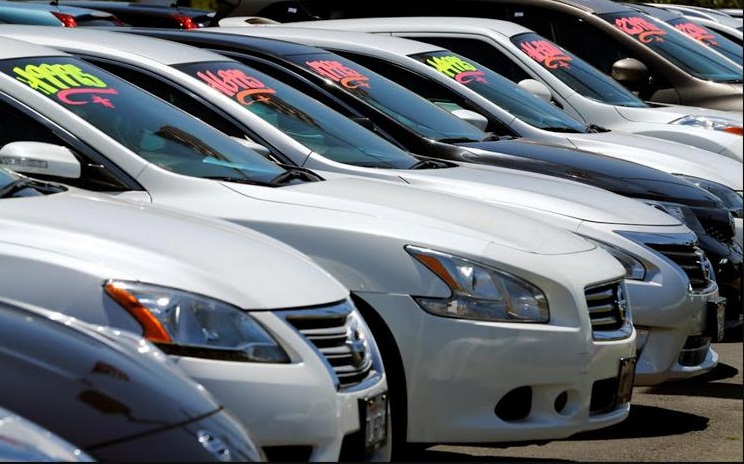Nigeria’s busy roads accommodate nearly 14 million cars, yet dealerships across the country face a persistent challenge: slow inventory turnover that leaves vehicles sitting unsold for long periods. Addressing this pressing issue, Carbin Africa, a B2B automotive startup established in 2023, entered the market with a clear mission to boost dealer profitability through consistent vehicle sales.
The journey of Carbin Africa’s founders, Femi Oriowo and Fawaz Abdul, began in 2015 during their time at the University of Lagos (UNILAG), where they met while participating in an OLX sales program. Later, their professional paths crossed again at Cars45, an automotive startup, where they played key roles in building a robust agent network for car sales. These experiences laid the groundwork for what would eventually become Carbin Africa.
A series of leadership changes at Cars45 motivated Oriowo and Abdul to venture into their own business in 2018. “In the first three years of running our business, we sold over 1,000 cars,” Oriowo shared. Reflecting on their journey, he noted that one of their biggest lessons was navigating the challenges of sourcing cars in the market and ensuring these vehicles were sold quickly.
The founders enlisted the expertise of COO and co-founder of Fixit45, Pankaj Bohhra, along with former Cars45 CEO Soumobroto Ganguly and Femi Folarin, VP of Trade at Cars45, to help establish Carbin Africa as a minimum viable product (MVP). Drawing on the extensive knowledge of their mentors, the startup was nurtured within the 54 Collective’s Gen F program—a venture studio that paved the way for Carbin Africa’s official incorporation in 2023.
“We participated in a three-month business incubation program where we focused on validating and testing our business concept. The program provided us with immense support and included a panel evaluation of our work,” Oriowo shared.
Carbin Africa positions itself as a complementary player in the automotive ecosystem rather than a competitor. While Fix45 and YC-backed Mecho Autotech cater to spare parts and after-sales services, Cars45 and Autochek focus on car sourcing and vehicle financing. Carbin Africa, on the other hand, targets car dealers and agents by offering them a centralized repository of vehicles and facilitating quick inventory turnover.
The African automotive market, valued at an estimated $20.5 billion in 2024, is projected to grow to $26.3 billion by 2029. Carbin Africa has set its sights on capturing 10% of this expanding market.
For car dealers, the process of acquiring vehicles can be both time-consuming and costly. “It takes about six weeks to ship a car, and when you add the two extra weeks needed for port clearing, the wait becomes even longer,” explained Oriwo, the CEO and Co-founder of Carbin Africa. “As a result, many car dealers end up parking unsold vehicles in garages while seeking alternative ways to make money. We aim to change that.”
Since March 2024, Carbin Africa has made remarkable progress, surpassing a billion Naira in Gross Merchandise Value (GMV) and selling over 80 cars. A standout feature of the company’s success is its AI-powered data platform. This advanced tool offers real-time access to 1,800 unique car listings across various dealerships, with updates every 30 minutes. This functionality enables more than 200 dealers and 850 agents on the platform to make well-informed decisions, identify in-demand car models, and optimize inventory. “From the very beginning, data aggregation has been central to our operations, but we took it to the next level in the second half of 2024,” Oriwo shared.
Typically, up to 10 sellers might list the same car on platforms like social media or Jiji, making it hard to track real availability. In contrast, Carbin Africa ensures its listings are live, accurate, and consistently updated across all locations. Additionally, the platform provides a mini report on each car’s condition, which Abdul, the company’s Co-founder, highlighted during a demonstration at their Lagos headquarters. By automating car data and expanding the network of dealerships and agents, Carbin Africa has significantly improved buying decisions.
To join Carbin Africa’s network, agents and car dealers must undergo a rigorous vetting process, including submitting their Corporate Affairs Commission (CAC) documents and National Identification Number (NIN) for background checks to prevent car theft. They also need a minimum of five cars to qualify for onboarding. The company has partnered with another automotive startup to verify vehicles and ensure no stolen cars are listed. Carbin Africa’s website operates exclusively for car agents and dealership owners, rather than being customer-facing. This approach focuses on facilitating transactions and driving sales conversions.
This data has provided valuable insights for the startup, revealing that most car purchases in Nigeria occur during the festive season or mid-year, when individuals receive cooperative payouts. Additionally, about 90% of the cars on Nigerian roads are pre-owned, while only around 5% are new. “It also helps us understand the routes through which cars enter the country,” Oriowo noted.
Macroeconomic conditions remain a significant hurdle for automotive startups. For instance, Mecho Autotech recently had to downsize, laying off staff from its 40-person team. However, Oriowo maintains confidence in the market’s ability to adapt.
“When constraints arise, the market may react temporarily. In April and May, we began seeing better numbers. Leveraging our data points is allowing us to identify trends. Many dealers rely on experience rather than data. By aggregating data points from the dealerships we connect with, we can pinpoint which brands perform well based on location. For example, the preferences in Lekki differ from those in Festac. It also highlights which brands to avoid,” Oriowo explained.
Abdul emphasized the transformative impact of these insights for car agents. Traditionally, agents would physically visit dealerships to check inventory. With Carbin Africa’s enhanced data tools, agents are no longer limited to a specific area within their local government; they can access a broader inventory and sell more vehicles. To further incentivize sales, the company introduced a leaderboard to gamify the process.
Autohub, the B2B arm that facilitates quick car sales for dealers, remains the company’s flagship product and largest revenue generator. While Oriowo declined to share specific figures, Carbin Africa earns its revenue by applying a competitive markup on its vehicles. With the introduction of analytics and CRM solutions tailored for dealers, the company is poised to redefine its profitability metrics.
In addition to its flagship product, Carbin Africa offers a suite of innovative solutions, including Dealer Mart, Car Flex, and Carbin Lease. Dealer Mart operates as a software-as-a-service platform designed specifically for car dealers. It leverages insights from dealerships to automate essential processes such as inventory sourcing, vehicle listings, quality verification, and other business-specific needs. Car Flex, on the other hand, is a credit facility aimed at supporting dealers navigating challenging macroeconomic conditions to keep their sales afloat. These loans are facilitated through a partnership with the digital lending platform Advancly.
Carbin Lease, another key offering, allows the business to lease vehicles—whether luxury or standard models—ensuring that cars don’t sit unsold in dealerships. Beyond these services, Carbin Africa also serves as a vital resource for Carloha Nigeria, the exclusive distributor of Chevy vehicles, and supplies cars for Sterling Bank’s car finance platform, AltDrive.
With a focus on achieving profitability in the near future, the company is aggressively promoting its value-added products alongside its flagship offering, targeting dealers as its primary customer base.
 We just launched our WhatsApp channel. Want to get the latest news from the Tech in Africa?
We just launched our WhatsApp channel. Want to get the latest news from the Tech in Africa?


